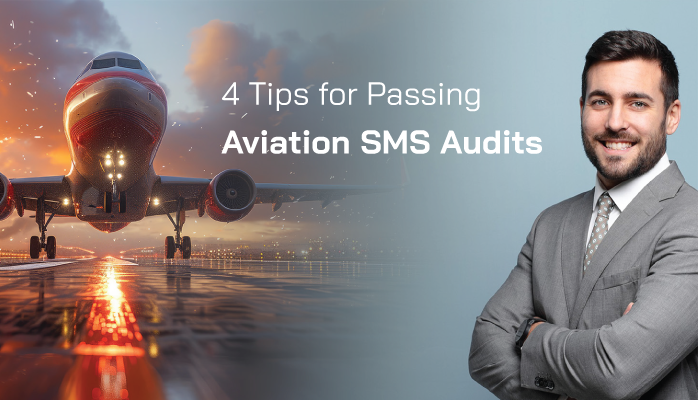Why Passing an Aviation SMS Audit Is Critical

Aviation Safety Management Systems (SMS) form the foundation of safe operations, and passing SMS audits is critical for demonstrating compliance with global safety standards while reinforcing an organization’s commitment to safety.
For aviation safety managers, audits are not merely regulatory requirements but opportunities to refine safety practices and build trust with regulators, staff, and passengers.
This article provides a global perspective on practical tips to pass aviation SMS audits, tailored for aviation safety managers. It explores regulatory drivers, key preparation strategies, common challenges, and real-world examples, ensuring relevance across diverse operational contexts—from high-traffic international hubs to remote regions like Alaska.
Related Aviation SMS Audit Articles
- How Often Should You Conduct Aviation SMS Audit
- 9 Best Strategies for Aviation Safety Audit Preparation [Free Audit Checklists]
- Aviation Safety Audit Preparation - 4 Free SMS Audit Templates
Understanding Aviation SMS Audits
SMS audits are comprehensive evaluations of an organization’s safety management processes, ensuring they align with regulatory standards and effectively mitigate risks. Conducted by regulatory authorities (e.g., FAA, EASA, CASA) or internal teams, audits assess four core SMS components:
-
Safety Policy: Clear safety objectives and organizational commitment.
-
Risk Management: Processes for identifying, assessing, and mitigating hazards.
-
Safety Assurance: Systems for monitoring and improving safety performance.
-
Safety Promotion: Training and communication to foster a safety culture.
SMS audits verify that organizations meet global safety standards, ensuring consistent safety across operations. In challenging environments like Alaska, where harsh weather and remote operations amplify risks, audits are critical to validate robust safety measures for tasks like de-icing or fueling. Globally, passing SMS audits demonstrates an organization’s dedication to safety, enhancing operational reliability and regulatory compliance.
Regulatory Drivers for SMS Audits
Global and regional aviation standards establish the framework for SMS audits, ensuring universal applicability:
-
ICAO Annex 19: The International Civil Aviation Organization mandates SMS implementation and regular auditing for all member states, setting a global benchmark for safety oversight .
-
Regional Regulatory Alignment: Authorities like the FAA (U.S.), EASA (Europe), CASA (Australia), and CAAC (China) align with ICAO, requiring periodic SMS audits to verify compliance. For example, FAA Advisory Circular 120-92B outlines audit expectations, while EASA’s regulations emphasize detailed SMS assessments.
-
Universal Requirement: Regardless of jurisdiction, SMS audits are a global expectation, ensuring safety consistency in established markets like North America and emerging sectors like Southeast Asia.
These frameworks make SMS audits a universal necessity, requiring aviation safety managers to prepare thoroughly to meet regulatory standards, whether in a bustling hub or a remote Alaskan operation.
8 Key Tips to Pass Aviation SMS Audits

Aviation safety managers can adopt the following globally applicable tips to ensure success in SMS audits:
-
Maintain Comprehensive Documentation
Keep detailed, organized records of all SMS processes, including risk assessments, incident reports, safety meeting minutes, and training logs. Use electronic SMS software to centralize data, ensuring easy access during audits. For example, clearly documenting hazard mitigation steps demonstrates proactive risk management, a key audit criterion. NBAA recommends structured documentation to streamline audit preparation, applicable in any operational context. -
Conduct Regular Staff Training
Train all employees—pilots, ground crew, and management—on SMS principles, emphasizing their roles in safety processes. Regular training sessions, tailored to local risks (e.g., cold-weather fueling protocols in Alaska or high-traffic ramp procedures in hubs), ensure staff are prepared for auditor questions. Training fosters confidence and consistency, critical for successful audit interviews across jurisdictions. -
Perform Mock Audits
Conduct internal mock audits to simulate regulatory inspections, using standardized checklists based on ICAO Annex 19 or regional standards. Mock audits identify gaps in documentation, training, or processes, allowing managers to address issues proactively. This practice, effective in both small operators and large airlines, prepares teams for scrutiny and refines SMS implementation globally. -
Foster a Just Culture
Promote a non-punitive environment where staff feel safe reporting hazards without fear of reprisal. A just culture encourages proactive safety engagement, impressing auditors by demonstrating a mature safety culture. This approach is universally valued, from Europe’s stringent regulators to emerging markets. -
Engage Leadership Commitment
Ensure senior management visibly supports SMS by attending safety meetings, allocating resources, and communicating safety priorities. Leadership buy-in signals a strong organizational commitment, a critical audit evaluation point across all regulatory frameworks. For example, a CEO’s presence at safety briefings can underscore SMS importance. -
Leverage Data for Safety Assurance
Use SMS analytics to monitor safety performance, tracking metrics like incident rates or hazard reports. Present data-driven improvements, such as reduced ground handling errors, to auditors, showcasing proactive risk management. This practice, effective in any SMS framework, demonstrates continuous improvement, a universal audit expectation. -
Prepare for Auditor Interviews
Coach staff to answer auditor questions confidently, focusing on their SMS roles and responsibilities. Role-play interviews to reduce anxiety and ensure clear, concise responses, particularly in multilingual or multicultural settings. Preparation ensures staff can articulate safety processes, impressing auditors globally. -
Address Findings Promptly
Develop and implement corrective action plans for past audit findings, documenting progress to demonstrate continuous improvement. Timely resolution of deficiencies, such as updating training programs or refining risk assessments, shows commitment to safety, a key audit criterion in all jurisdictions.
These tips are designed to remain relevant across time and regions, ensuring audit success in diverse aviation environments, from urban hubs to remote Alaskan operations.
Related Aviation SMS Audit Articles
- 4 Things Safety Managers Do to Perform Well on Aviation SMS Audits
- SRM-SA Aviation SMS Audit Preparation - 4 Free Checklist Templates
- 3 Traits Good Aviation Safety Auditors Share
Challenges in Passing Aviation SMS Audits

Aviation safety managers face several challenges in preparing for SMS audits:
-
Resource Constraints: Small operators, whether in developed or emerging markets, may lack the budget or personnel for comprehensive audit preparation, such as extensive training or digital documentation systems.
-
Cultural Differences: Varying attitudes toward safety across cultures can affect staff engagement with SMS processes, requiring tailored communication strategies to align teams (Aviation Pros).
-
Complex Regulatory Requirements: Navigating diverse regulations, such as EASA’s detailed SMS standards or ICAO’s broad guidelines, can be challenging for operators with global operations.
-
Staff Turnover: High turnover disrupts training continuity and SMS knowledge, complicating audit readiness, especially in high-demand aviation markets.
These challenges can be addressed with scalable, timeless strategies, such as simplified training modules or Web-based tools, to ensure audit success worldwide.
Real-World Examples of Successful Audit Preparation
The following examples illustrate how organizations in diverse contexts successfully prepared for SMS audits:
Example 1: Regional Airline Audit Success
A regional airline in a developed aviation market passed a rigorous EASA audit by implementing regular mock audits and maintaining a centralized online documentation system. Comprehensive staff training on SMS roles ensured confident interviews with auditors, who praised the airline’s proactive approach. This model, focusing on preparation and documentation, is applicable to operators globally, from small carriers to large airlines.
Have You Read
- Training Management in Aviation SMS
- 6 Tips to Improve Aviation SMS Training Courses
- How to Automate Aviation SMS Training in 4 Steps Using Your Safety Program
Example 2: Remote Operator’s Audit Excellence
An operator in a remote, weather-challenged region excelled in a CASA audit by prioritizing training on environmental risks, such as cold-weather fueling errors, and fostering a just culture for hazard reporting. A online and offline reporting platform allowed real-time data access, impressing auditors with the operator’s safety assurance processes. This approach, emphasizing tailored training and technology, is relevant to remote regions like Alaska or rural Africa.
Example 3: Major Hub Airport Overcoming Audit Challenges
A major hub airport initially faced audit findings due to inconsistent vendor documentation across ground handling teams. By implementing standardized SMS checklists, conducting joint training with vendors, and integrating audit data into SMS analytics, the airport resolved deficiencies and passed subsequent audits. This example, highlighting vendor coordination and data use, offers lessons for high-traffic environments worldwide, from Dubai to New York.
These examples demonstrate how preparation strategies can lead to audit success, offering replicable models for aviation safety managers in any operational context.

Global Perspective: Adapting Audit Preparation to Diverse Contexts
Aviation safety managers must tailor audit preparation strategies to varied global contexts while maintaining universal principles:
-
High-Traffic Hubs: In hubs like Hong Kong or Frankfurt, focus on coordinating multiple departments and vendors to ensure consistent SMS implementation, using online tools for streamlined documentation.
-
Remote Regions: In areas like the Arctic, rural Africa, or Alaska, prioritize training on environmental risks (e.g., extreme weather operations) and leverage Web-based platforms to overcome logistical challenges.
-
Emerging Markets: In growing sectors like India or Southeast Asia, support staff with simplified SMS processes and training to meet increasing regulatory demands, ensuring audit readiness.
By applying these timeless tips, managers can achieve consistent audit outcomes, whether preparing for audits in a single region or across multiple continents. For instance, in Alaska, training on cold-weather risks can enhance audit performance, while the same principles apply to tropical regions facing different operational challenges.
Conclusion: Mastering SMS Audits for Global Safety
Passing aviation SMS audits is a global imperative for aviation safety managers, ensuring compliance with international standards and reinforcing a commitment to safety. By adopting timeless strategies—such as comprehensive documentation, regular staff training, mock audits, fostering a just culture, engaging leadership, leveraging data, preparing for interviews, and addressing findings promptly—managers can excel in audits worldwide.
Addressing challenges like resource constraints, cultural differences, complex regulations, and staff turnover with scalable solutions ensures enduring success. Real-world examples from regional airlines, remote operators, and major hubs illustrate the impact of effective preparation, offering lessons applicable in any aviation context.
Whether in the challenging conditions of Alaska’s remote airstrips or the bustling hubs of Asia, these tips empower aviation safety managers to pass SMS audits and build a stronger, safer aviation ecosystem for operators, staff, and passengers worldwide.
Are your auditing tools user-friendly with online AND offline capabilities? If not, we can help.
Last updated May 2025.






